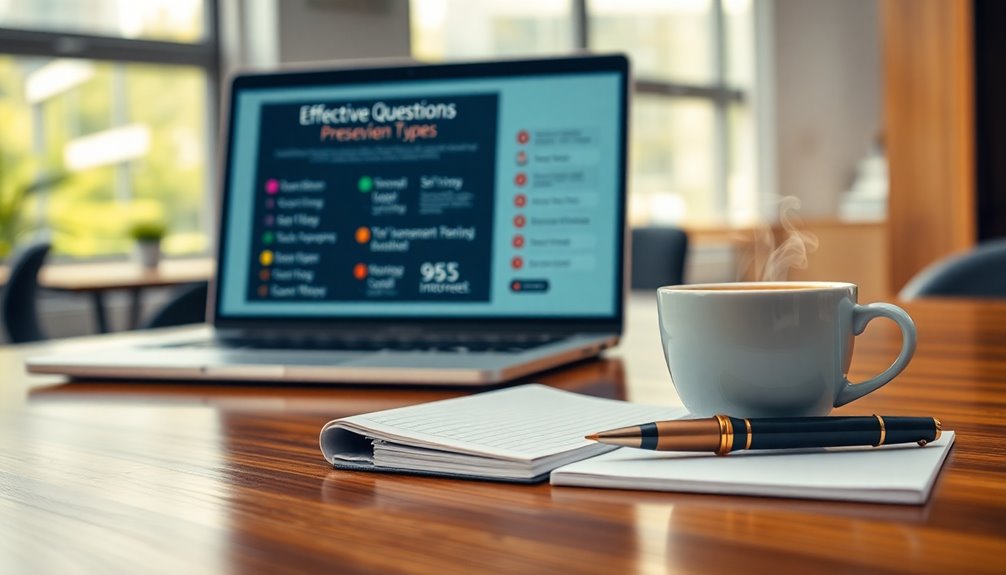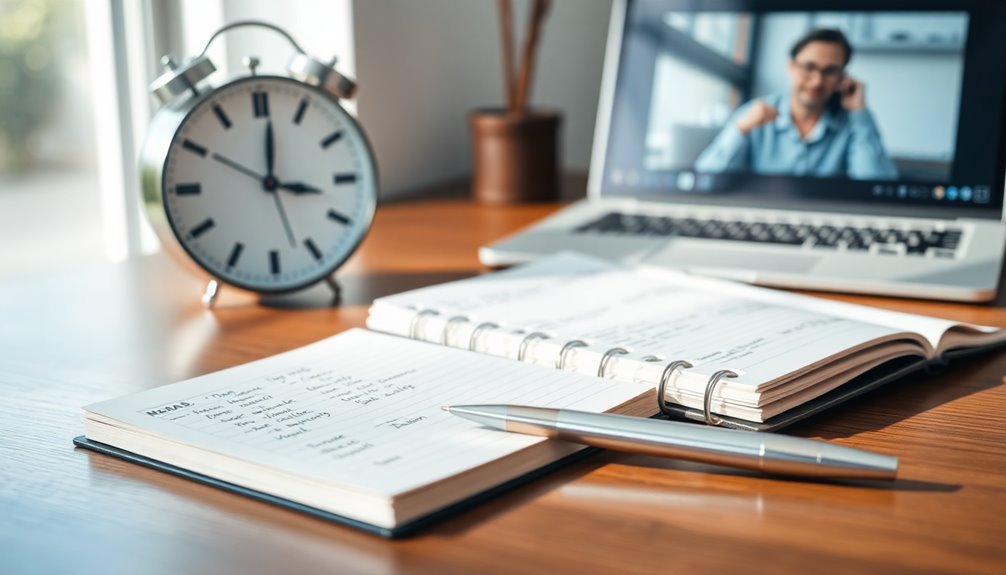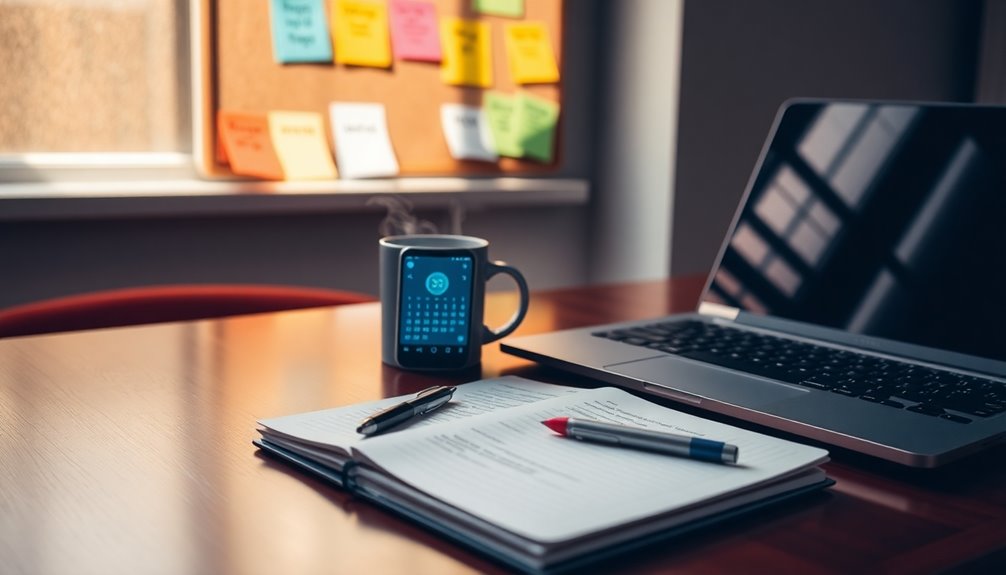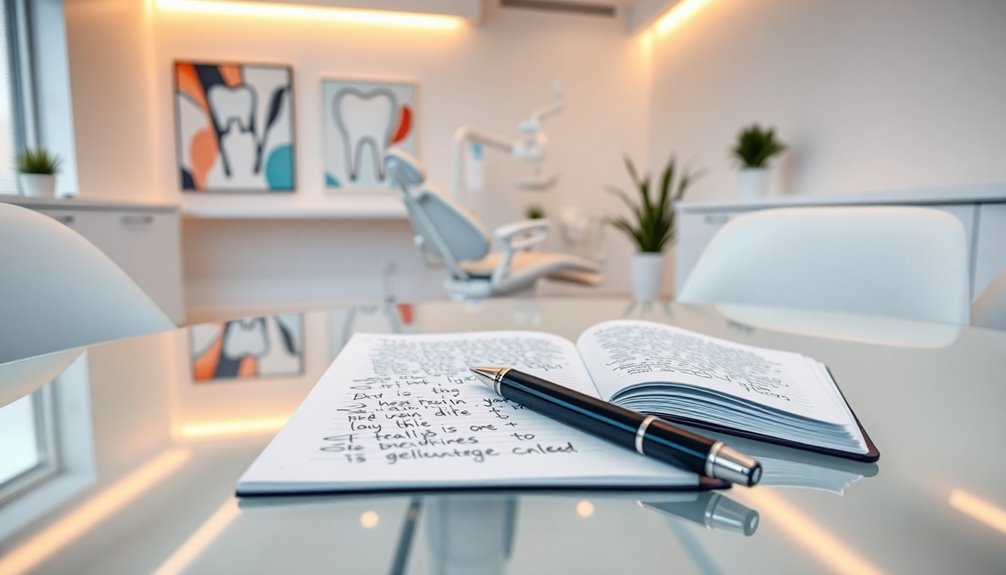Revealing the secrets of pre-screening interviews can transform your hiring process. These initial assessments help you evaluate candidates beyond their resumes, checking for qualifications, personality, and fit with your team. By asking the right questions about cultural alignment and problem-solving, you filter out misaligned candidates early, saving time and resources. Scheduling efficiently and communicating clearly sets the stage for a successful interview. Don't forget to create a conversational atmosphere to encourage open dialogue. If you're keen to enhance your pre-screening skills, there's more valuable insight to discover ahead.
Key Takeaways
- Pre-screening interviews are essential for assessing candidate qualifications, personality, and cultural fit beyond just their resumes.
- Effective questions reveal insights into candidates' motivations, work ethic, and problem-solving abilities.
- Clear communication before the interview builds trust and prepares candidates for a successful interaction.
- Efficient scheduling and the use of calendar tools help prevent confusion and streamline the interview process.
- Maintaining a conversational tone during the interview encourages open dialogue and a more accurate evaluation of candidates.
Importance of Pre-Screening Interviews

When you think about the hiring process, pre-screening interviews stand out as a crucial step. They serve as your first opportunity to assess candidates beyond their resumes.
By conducting these interviews, you can quickly gauge each applicant's qualifications, personality, and enthusiasm for the role. This initial assessment helps you filter out candidates who may not align with your company's needs, saving both time and resources.
Pre-screening interviews give you valuable insights into candidates' motivations and potential fit within your team. By focusing on the most promising applicants, you enhance the overall quality of your hiring process, ensuring you invest time in candidates who are genuinely excited about contributing to your organization.
Effective Question Types

Effective pre-screening interviews hinge on the types of questions you ask. The right questions help reveal a candidate's fit for your company.
Here are three effective question types to evaluate:
- Cultural Fit and Interest: Ask, "What do you know about us?" to gauge their research and motivation.
- Self-Awareness and Work Ethic: Inquire, "What are your three greatest strengths and weaknesses?" to assess their self-awareness and honesty.
- Problem-Solving Skills: Pose the question, "Have you ever had a conflict with a coworker, and how did you resolve it?" to evaluate their approach to challenges.
Scheduling the Interview

Scheduling the interview is essential for setting the tone of the hiring process. You should confirm the interview date and format with candidates to avoid confusion.
During your initial interactions, assess their written and verbal communication skills; this gives you a glimpse of their professionalism.
Utilize a calendar tool for efficient scheduling and send a calendar invite to guarantee everyone is on the same page regarding timing.
It's also important to allow flexibility—if candidates suggest alternate times, be open to accommodating them. This approach not only shows respect for their time but also fosters a positive impression of your organization right from the start.
Pre-Interview Communication

Ensuring clear communication before the interview sets a positive tone for the entire process.
To prepare candidates effectively, you should:
- Reach out 24 hours prior to confirm the interview, restating the date and time. This reminder builds excitement and shows your commitment.
- Provide detailed instructions based on the interview format. Whether it's a phone call or video chat, clear guidelines help candidates feel more at ease.
- Include your contact information for any last-minute questions. This openness fosters trust and encourages candidates to engage.
Conducting the Interview

When you're ready to conduct the interview, preparation is key to ensuring a smooth and productive conversation. Compile a list of relevant questions that align with the role, focusing on cultural fit, work ethic, and problem-solving skills.
Use this list to guide the discussion, taking brief notes to capture candidate responses. This will help you evaluate their suitability later. Stay flexible; adjust your questions based on their answers to dig deeper into their qualifications.
Maintaining a conversational tone encourages candidates to open up, providing you with valuable insights. Finally, keep the interview focused and on track to make the most of the limited time, ensuring you cover all essential areas without unnecessary distractions.
Time Management Tips

Managing time effectively during pre-screening interviews can greatly enhance the overall efficiency of the hiring process.
To make the most of your time, consider these key tips:
- Set a Time Limit: Keep interviews between 15-30 minutes. This encourages focused discussions and respects candidates' schedules.
- Communicate Expectations: Clearly inform candidates about the expected duration in your initial communication. This prepares them for a concise conversation.
- Stay on Track: Use a timer or clock to monitor your progress. Stick to key qualifications and avoid unnecessary tangents to guarantee you cover essential topics.
Post-Interview Follow-Up

A successful post-interview follow-up is essential for maintaining a positive candidate experience and keeping communication transparent.
After the interview, promptly update candidates on the next steps in the hiring process. Let them know when they can expect feedback and decisions. This transparency helps build trust and keeps candidates engaged.
If you decide to move forward with a candidate, express your excitement about their potential contributions to the team. If not, provide constructive feedback where possible; it can leave a lasting positive impression.
Encourage candidates to reach out with any questions, reinforcing your commitment to open communication.
Ultimately, a thoughtful follow-up not only enhances the candidate experience but also reflects positively on your organization's reputation.
Collaborating With Hiring Teams

Effective collaboration with hiring teams is essential for streamlining the recruitment process and guaranteeing that all perspectives are considered.
By working together, you can enhance decision-making and find the best candidates. Here are three key strategies to improve collaboration:
- Define Roles and Responsibilities: Make sure everyone knows their role in the hiring process. This clarity helps avoid confusion and overlaps during candidate evaluation.
- Share Insights and Feedback: After pre-screening interviews, discuss your findings with the team. Open communication fosters a shared understanding of each candidate's strengths and weaknesses.
- Align on Candidate Criteria: Establish clear criteria for evaluating candidates to guarantee everyone's on the same page. This alignment helps streamline discussions and speeds up the decision-making process.
Frequently Asked Questions
How Long Should I Wait for a Response After a Pre-Screening Interview?
After a pre-screening interview, you should typically wait about one to two weeks for a response.
Companies often need time to review candidates and make decisions. If you haven't heard back within that timeframe, it's perfectly acceptable to follow up with a polite email.
This shows your continued interest and can help you stay informed about your application status.
Patience is key, but proactive communication can also be beneficial.
What Should I Wear for a Video Pre-Screening Interview?
For a video pre-screening interview, you should aim for a professional appearance. Choose a clean, well-fitting shirt or blouse, and if necessary, add a blazer to elevate your look.
Avoid overly bright colors or distracting patterns, as they can take attention away from you. Make certain your hair is neat and groomed.
Lighting is essential, so position yourself in a well-lit area, and check your background for a tidy, distraction-free environment.
Can I Ask My Own Questions During the Pre-Screening Interview?
Yes, you can definitely ask your own questions during a pre-screening interview. It shows your interest and engagement in the position.
Prepare a few thoughtful questions ahead of time, like inquiries about company culture or team dynamics. Just be mindful of the time and guarantee your questions align with what's been discussed.
This not only helps you gauge if the role is a good fit but also leaves a positive impression on the interviewer.
How Do I Handle Nerves Before a Pre-Screening Interview?
Nerves can feel like a fluttering in your stomach, but don't let them steal your confidence.
Before your pre-screening interview, take a few deep breaths to calm your mind. Visualize a successful conversation and remind yourself of your qualifications.
Practice with a friend or in front of a mirror to get comfortable with your answers.
What if I Need to Reschedule My Pre-Screening Interview?
If you need to reschedule your pre-screening interview, don't panic.
Reach out to the recruiter or HR contact as soon as possible. Explain your situation briefly and suggest alternative dates and times that work for you.
Most companies understand that conflicts arise. Make sure to express your enthusiasm about the opportunity and appreciation for their flexibility.
Confirm the new date once it's set, and prepare thoroughly for the rescheduled interview.
Conclusion
By mastering pre-screening interviews, you're not just filtering candidates; you're uncovering potential, fostering connections, and shaping your team's future. You're streamlining processes, saving time, and enhancing quality in your hiring efforts. Embrace these strategies, ask the right questions, and communicate effectively to elevate your recruitment game. Remember, every interview is an opportunity to find that perfect fit, to build a stronger team, and to drive your organization toward success. Don't underestimate the power of a well-conducted pre-screen!









